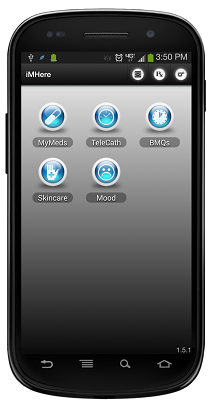 iMHere system
iMHere system
Two small studies published results recently that found health-tracking smartphone applications can improve the patient's health.
One study, published in the American Journal of Physical Medicine & Rehabilitation, found that people with spina bifida, a spine condition, who used a smartphone app to track their health improved their daily self-management of the condition. Patients who partook in the study had myelomeningocele, which is the most severe type of spina bifida.
The yearlong study split 23 patients, aged 18 to 40, into two groups. The intervention group received the iMHere system, which consists of smartphone-based tools as well as a web-based portal to communicate with healthcare providers. The smartphone offerings include information on medications, reminders to perform daily self-care activities, and a place to monitor mood and depression symptoms. The other group received standard spina bifida care.
After a year, researchers compared the self management skills of patients who used the iMHere system with the other group's. Researchers found that patients who used the iMHere system met or exceeded their expectations for health tracking. This group was more likely to talk to a wellness coordinator about new information and symptoms and they said they gained independence in some of their spina bifida self-management skills. Researchers also found that the app's higher use of reminders to manage health did not decrease the rate of events requiring medical attention.
The other study, led by researchers at Temple University and published in the journal Telemedicine and eHealth, found that patients who used an app to report chronic obstructive pulmonary disease (COPD) symptoms helped to detect and treat disease exacerbations early.
The study of 30 patients ran for 320 days. Researchers evaluated patients' ability to report symptoms daily with the app as well as the ability of the Temple Lung Center to respond to patients who were reporting worsening symptoms in the app.
Researchers found that the average reporting compliance was 85.6 percent and the median reporting compliance was 90.7 percent. The average response time for all alerts was 6.64 hours and for over 50 percent of worsening COPD symptom reports, patients received responses that included treatment recommendations in less than six hours.



















